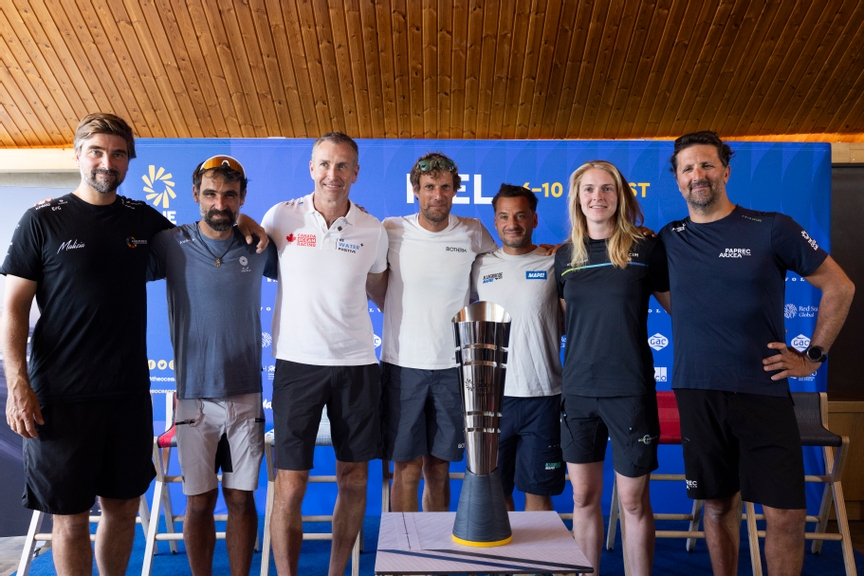IMOCA teams in The Ocean Race Europe set to compete in the new Racing for the Ocean Challenge

The seven IMOCA teams contesting The Ocean Race Europe are taking part in a new challenge designed to encourage and recognise sustainable principles in their actions and management, and the measures they take to reduce the climate impact of their activities.
“Racing for the Ocean Challenge,” is an off-the-water initiative created by The Ocean Race organisation in collaboration with IMOCA that assesses and evaluates teams’ sustainable actions and impact throughout the six-week race which starts from Kiel in Germany on Sunday.
Teams will score points on a range of criteria including sustainability management within their own team, their involvement in the race's science programme, their advocacy of sustainable principles and financial engagement in this area. An external jury will also assess teams’ wider impact through their projects or causes which can be environmental or social.
At the prize giving at the end of the race, at Boka Bay in Montenegro on September 21, one winner of the Racing for the Ocean Challenge will be declared at the conclusion of what will have been a “Beta” version of the scheme. This is designed to test it ahead of a full rollout in the next Ocean Race around the world in 2027.
Lucy Hunt, Ocean Impact Director at The Ocean Race, says Racing for the Ocean Challenge can have a big impact on the global following of The Ocean Race Europe. “We have an amazing event and a platform that can have this huge ripple effect in connecting people with the ocean,” she said. “We are determined to engage And why not engage the teams and the sailors themselves, as well as all of our stakeholders and the teams and the sailors themselves, so we can make a bigger impact and a bigger positive impact?”
Hunt said the Challenge reflects the fact that any major sporting event organised on the ocean must now incorporate climate-aware principles. “Anyone who is serious about sports and going forward and organising sports events has to look at sustainability seriously, and look at their footprint as an event and then see how they can minimise it, and also create positive effects through restoration and regeneration and engaging more people in these important topics and actions,” she said.
The concept of an off-the-water competition between teams in this area has been an objective of The Ocean Race organisation for some years and there had been hopes that a Beta test would have been possible at the inaugural Ocean Race Europe in 2021. That did not happen in an event heavily constrained by the Covid pandemic. But this time the Challenge has been written into the Notice of Race and the teams have been engaging in the scheme during the build-up to the start for the last two years.
Hunt says it’s a great way to take existing commitments on the environment forward. “We’ve been working on sustainability for a long time and the teams have engaged with it, but now we’ve added a challenge that makes it more engaging and we get to celebrate it at the end of the race as well,” she said.
“Most of the teams in the last race were into sustainability and messaging as well, each with their own campaign and joining our global effort. Now we are adding that extra element of competition and challenge around it and putting a scoring system in place which is going to help that ripple effect,” she added.
Hunt said the Beta test is a great opportunity to fine tune the Challenge and see how it can be improved ahead of the next Ocean Race. “It will help the teams understand where they can get involved, how we can make a bigger impact, how we can drive them to create more impact – either socially or environmentally – and it will be a chance to celebrate wins and the things that they have done. We will also see teams sharing some of their knowledge as well, so that in future, after this Challenge, they will be wiser and will learn from what other teams have done and be able to up their game on impact and sustainability.”
Imogen Dinham-Price, Partnerships and Sustainability Manager at IMOCA, agrees that the Challenge can build on work IMOCA teams have already been doing. “The aim is to collaborate around sustainability and optimise and highlight their projects and causes and show what they are doing as a team,” she said. “So it’s about what they are doing already, but also encouraging them to go further because some fantastic teams are already doing some excellent work in this area.”
Dinham-Price also made the point that The Ocean Race Europe, with its diverse menu of stopover cities, which include Portsmouth in the UK, Cartagena in Spain, the French port of Nice and Genoa in Italy, provides a great opportunity to project ideas in this area. “It really is an opportunity that we are starting to see more in IMOCA Globe Series races,” she said.
“The Racing for the Ocean Challenge promotes positive change which is going on within IMOCA and through a race which provides one of the best opportunities we have to showcase this and at the end we will see that there has been positive change,” she added.